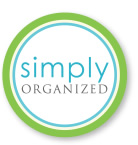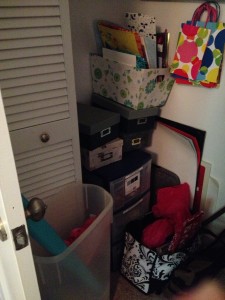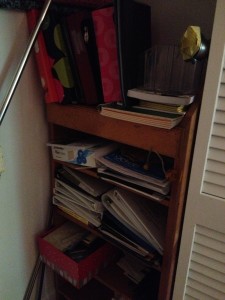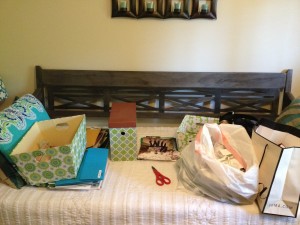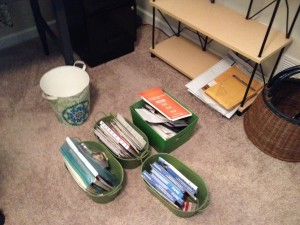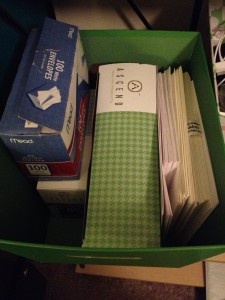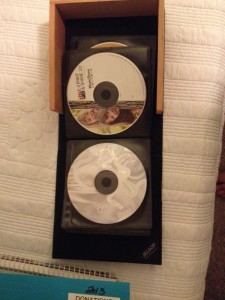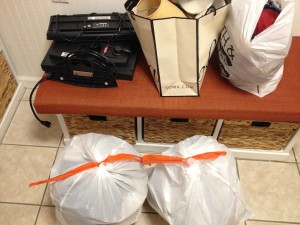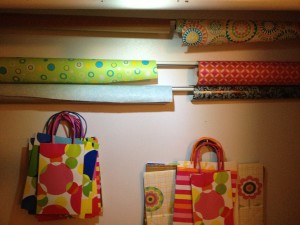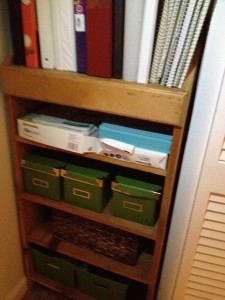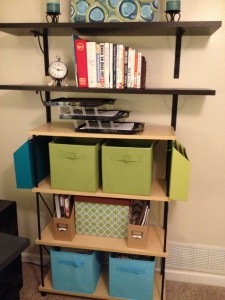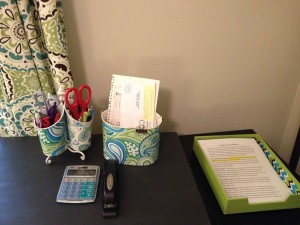I am taking you on a “behind the scenes” look into what my office looked like after one year of regular use including before and after photos. I file my papers and put things back where they go each day but I still have to do de-cluttering from time-to-time. Why on earth am I showing you this? Because #1. I’m a risk taker and #2. I want everyone to know that even organizers have to spend a little time each week (and at least an hour or so each year) to keep their space organized.
HOW TO ORGANIZE YOUR HOME OFFICE
1. Develop a Vision:
If your office is used for more than just work, set up zones:
Work, Area for kids (homework or play), Wrapping or crafts, Exercise area, Guest room and Storage
*My office is used for work, wrapping gifts and has a daybed in it for guests*
*BEFORE* – Closet and daybed during de-cluttering process
2. Arranging Your Space
Your desk should fit your space
Arrange it facing a door or window (not a wall)
Have a comfortable chair (make sure it fits under your desk)
Have action or desktop files at hand
Have a filing cabinet handy (top can be used for printer)
Bookcase
3. Desk Area
Sort all like items
Toss or donate unwanted and extras
Store like items together
Store extra items in closet, bookcase or magnetic strip
Desk should only hold items you use every day
*SORT all like items: photos, envelopes, software disks*
*DONATE*
4. Filing
Create a system for paper and electronic
Sort, file and purge regularly
Have a desktop or hanging action file (label: pay, call, file, pending, read) to keep papers from piling up on your desk
Filing Cabinet: Files can be color coded by main topics
Ex: Banking = Red hanging file with each bank name and accounts in separate folders within main red file, Insurance = Blue with auto, home, health in separate folders within the blue file.
Vital Records File
Set up a file, box or drawer where copies of all your most important documents are kept (originals in fire-proof safe or bank deposit box):
Passport, Birth certificate, Credit card numbers, Bank account numbers, Financial documents and or Insurance documents
5. E-mail System
Use folders to sort and store e-mails (use the same folder names as your paper filing system)
Flag important e-mails that are high priority
Have separate addresses for work and personal
Purge e-mails regularly
6. Store items not used regularly
Take advantage of all vertical, closet and under-bed space:
Use built- in book shelves, Hang shelving, Hooks, Clear shoe/ pocket holders on back of door and under bed boxes for extra storage
7. Use Calendars to track appointments and tasks:
Wall calendar or Digital calendar (make sure to sync) – color coded for each family member
Block out time it takes for each task (from time you leave for appointment until time you get back)
Allocate twice as much time for each task
Break down tasks into small steps and use “do” dates as well as “due” dates
*AFTER*
*Wrapping area and extra supplies in closet*
*Daily supplies on shelf with action files on sides*
*Top of desk*
I hope you enjoyed seeing my imperfections :).
Please let us know if you need help organizing your home office or any other space by calling Simply Organized at 404-825-2105 or send me an e-mail: heather@simplyorganizedyou.com
